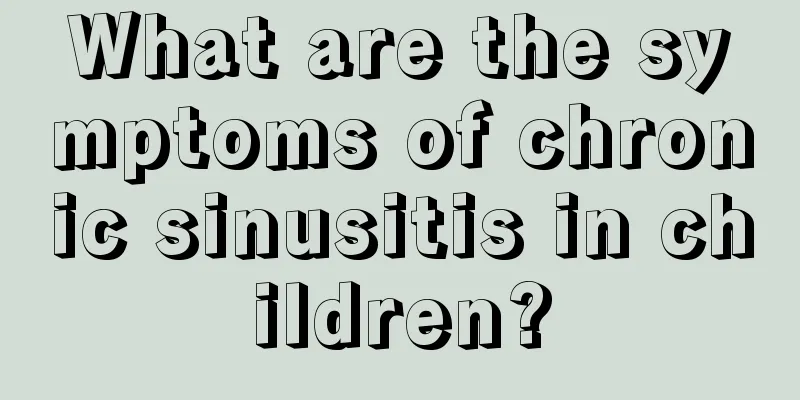What are the symptoms of chronic sinusitis in children?

|
Chronic sinusitis in children is very harmful to their physical health. After the onset of the disease, children are prone to nasal congestion and purulent nasal discharge. They also often feel headaches and dizziness, and their sense of smell will be reduced. The course of chronic sinusitis in children is relatively long, even lasting for several years, and is relatively difficult to treat. Bacterial infection is currently the main cause of chronic sinusitis in children. The following are some symptoms of chronic sinusitis in children. Children with chronic sinusitis have varying degrees of headaches, dizziness, lack of energy, and memory loss; varying degrees of nasal obstruction, purulent nasal discharge, and decreased sense of smell; more serious patients have symptoms such as fatigue, loss of appetite, difficulty concentrating, and insomnia. During nasal examination, the middle turbinate is often found to be enlarged, edematous, or polypoid. If sinusitis is not treated promptly, it may spread to adjacent tissues or organs, such as the orbit, cranium, etc., or develop along the ducts, such as through the Eustachian tube to the middle ear, or descend to affect the respiratory tract and digestive tract. In addition, children are prone to runny nose after becoming ill, which is mostly purulent, yellow, green or gray-green. Patients with a long course of illness may have nasal discharge with breath, and the purulent discharge can often flow through the posterior nostril to the throat. Patients feel that there is phlegm in the throat, which is often spit out after suctioning the throat. Some children also have a blocked nose after being ill, which is caused by congestion of the nasal mucosa, hypertrophy of the nasal conchae or nasal polyps. Sometimes it is also due to excessive purulent mucus, and the nasal congestion will be relieved after blowing out the nose. Some children begin to experience a decline in their sense of smell after suffering from chronic sinusitis. This is mainly because after the nose is blocked, the child's nasal mucosa swells. At this time, the airflow cannot smoothly enter the olfactory area of the nose, resulting in a dull sense of smell. Another child had headaches and a feeling of heaviness in the brain due to chronic sinusitis, which was mainly caused by poor drainage caused by sinusitis. |
<<: What should I do when new teeth grow?
>>: Can swimming be used as exercise for babies?
Recommend
How to treat a 3-year-old child with a fever of 38 degrees
When a 3-year-old child has a fever of 38 degrees...
Why does my baby have dry stools after eating complementary foods?
To put it simply, dry stool means that during the...
How to quickly replenish water for dehydrated babies
People are most likely to suffer from diarrhea in...
Why do children want to vomit after eating?
For children, no matter what abnormal conditions ...
Causes of calf cramps in teenagers
During the process of growth and development, man...
Will the rash recur?
The problem of roseola in children can be said to...
What can a five-year-old boy eat to promote bone growth?
When children are growing, families still need to...
Six-month weaning precautions
We all know that breast milk is good for the fetu...
What should a 5-year-old child eat when he has a cough?
When a 5-year-old child is sick, he or she can cl...
What should you pay attention to in your baby's diet after weaning?
Babies need to be weaned when they reach a certai...
What are the causes of sleepwalking in children?
I believe everyone has seen sleepwalking, which i...
The child had a fever after taking a bath.
Many people don’t like to bathe children, especia...
How to treat gastroenteritis in children
Children's gastrointestinal disease is actual...
Baby's self-awareness sensitive period
Babies will have a sensitive period of self-aware...
Can my baby take a bath if he has a cold and a runny nose? The approach must be correct
When babies have a cold and a runny nose, many pa...









